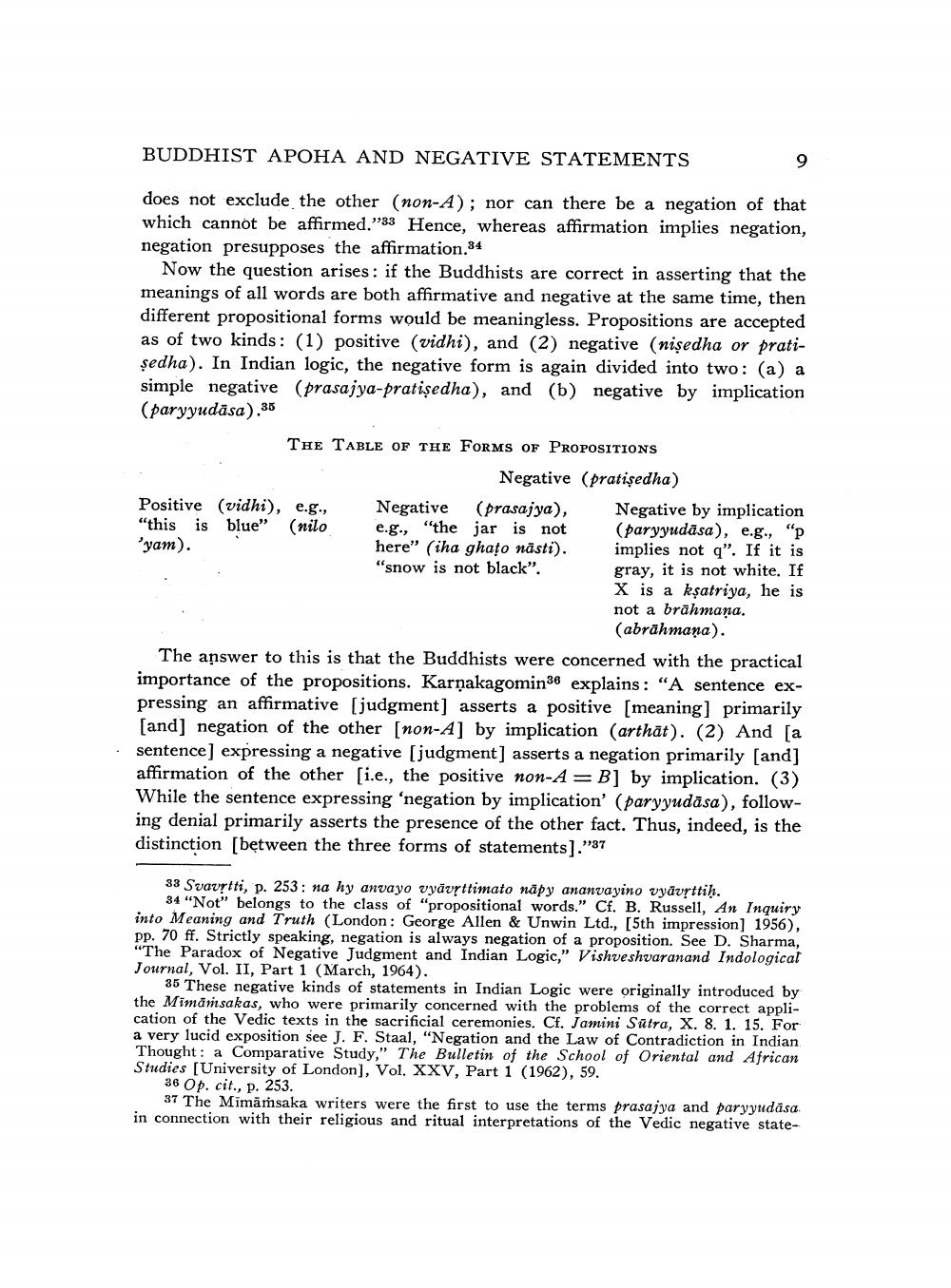________________
BUDDHIST APOHA AND NEGATIVE STATEMENTS
does not exclude the other (non-A); nor can there be a negation of that which cannot be affirmed."33 Hence, whereas affirmation implies negation, negation presupposes the affirmation.34
Now the question arises: if the Buddhists are correct in asserting that the meanings of all words are both affirmative and negative at the same time, then different propositional forms would be meaningless. Propositions are accepted as of two kinds: (1) positive (vidhi), and (2) negative (nişedha or pratiședha). In Indian logic, the negative form is again divided into two: (a) a simple negative (prasajya-pratiședha), and (b) negative by implication (paryyudāsa).35
THE TABLE OF THE FORMS OF PROPOSITIONS
Negative (pratiședha) Positive (vidhi), e.g., Negative (prasajya), Negative by implication "this is blue” (nilo e.g., "the jar is not (paryyudāsa), e.g., "p yam).
here" (iha ghato năsti). implies not q". If it is "snow is not black".
gray, it is not white. If X is a ksatriya, he is not a brāhmana.
(abrāhmana). The answer to this is that the Buddhists were concerned with the practical importance of the propositions. Karņakagomin 36 explains: "A sentence expressing an affirmative (judgment] asserts a positive (meaning] primarily [and] negation of the other [non-A] by implication (arthāt). (2) And [a sentence] expressing a negative (judgment) asserts a negation primarily [and] affirmation of the other [i.e., the positive non-A=B] by implication. (3) While the sentence expressing 'negation by implication' (paryyudāsa), following denial primarily asserts the presence of the other fact. Thus, indeed, is the distinction [between the three forms of statements]."37
33 Svavrtti, p. 253: na hy anvayo vyāvrttimato napy ananvayino vyāvrttih.
34 "Not" belongs to the class of "propositional words." Cf. B. Russell, An Inquiry into Meaning and Truth (London: George Allen & Unwin Ltd., [5th impression] 1956), pp. 70 ff. Strictly speaking, negation is always negation of a proposition. See D. Sharma, "The Paradox of Negative Judgment and Indian Logic," Vishveshvaranand Indological Journal, Vol. II, Part 1 (March, 1964).
35 These negative kinds of statements in Indian Logic were originally introduced by the Mimärsakas, who were primarily concerned with the problems of the correct application of the Vedic texts in the sacrificial ceremonies. Cf. Jamini Satra, X. 8. 1. 15. For a very lucid exposition see J. F. Staal, "Negation and the Law of Contradiction in Indian Thought: a Comparative Study," The Bulletin of the School of Oriental and African Studies [University of London), Vol. XXV, Part 1 (1962), 59.
36 Op. cit., p. 253.
37 The Mimārsaka writers were the first to use the terms prasajya and paryyudāsa. in connection with their religious and ritual interpretations of the Vedic negative state




